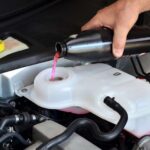Catalytic converter replacement can be a significant expense. This article explores the factors influencing Catalytic Converter Cost, ranging from vehicle type to part choice, and discusses insurance coverage for theft.
Factors Affecting Catalytic Converter Cost
Several factors contribute to the overall cost of replacing a catalytic converter. Understanding these factors can help you better estimate the potential expense and make informed decisions.
Vehicle Type and Model
The type of vehicle you own significantly impacts the price of a catalytic converter. Domestic sedans like Chevrolet or Ford generally have less expensive catalytic converters, often starting around $900. Conversely, luxury or large vehicles require more complex and costly converters, potentially exceeding $3,500. The make and model of your car dictate the specific converter required, directly influencing the price.
Part Choice: Aftermarket vs. OEM
Choosing between an aftermarket or original equipment manufacturer (OEM) part significantly affects the cost. Aftermarket catalytic converters are generally cheaper, offering a budget-friendly option. However, they may not last as long as OEM parts, potentially requiring replacement sooner. OEM converters, while more expensive, tend to have a longer lifespan, often lasting around ten years. Aftermarket brands may start to fail after only a few years. Ultimately, the decision involves balancing cost and longevity. “With catalytic converters,” notes automotive expert John Petronio, “you do get what you pay for.”
Labor Costs
Compared to the part itself, labor costs for catalytic converter replacement are relatively minor. However, the complexity of the installation can vary depending on the vehicle, potentially affecting the final labor charge.
Does Insurance Cover Catalytic Converter Theft?
Insurance coverage for catalytic converter theft varies depending on your provider and policy. Comprehensive coverage plans often include coverage for theft, but it’s crucial to confirm with your insurer. If your current plan doesn’t cover catalytic converter theft, consider adding it, especially given the rising incidence of such thefts. Contact your insurance company to review your policy and ensure adequate coverage.
Preventing Catalytic Converter Theft
While no method guarantees prevention, several steps can deter thieves. Parking in well-lit or secure areas, etching your VIN onto the converter, and installing an anti-theft shield can make your vehicle a less appealing target. These shields, costing between $200 and $600, create a physical barrier that makes removal more difficult and time-consuming, deterring opportunistic thieves. While not a foolproof solution, these measures can significantly reduce the risk of theft.
Conclusion
Catalytic converter cost is a complex issue with various influencing factors. Understanding these factors, considering preventative measures, and confirming insurance coverage are essential steps in protecting your vehicle and budget. Remember to consult with a trusted mechanic for personalized advice and accurate cost estimates for your specific car.

